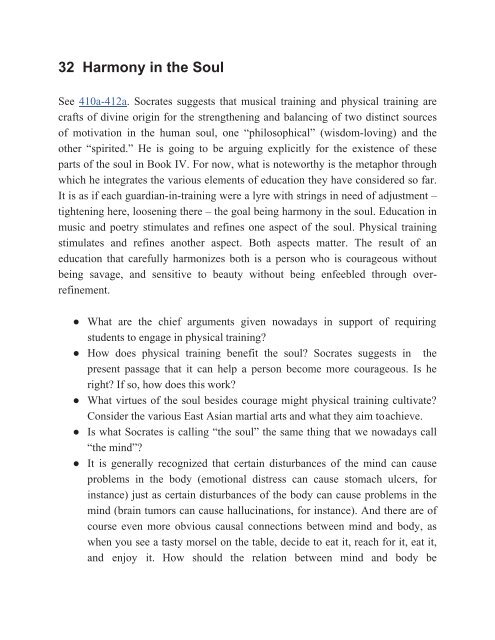The Intelligent Troglodyte’s Guide to Plato’s Republic, 2016a
The Intelligent Troglodyte’s Guide to Plato’s Republic, 2016a
The Intelligent Troglodyte’s Guide to Plato’s Republic, 2016a
You also want an ePaper? Increase the reach of your titles
YUMPU automatically turns print PDFs into web optimized ePapers that Google loves.
32 Harmony in the Soul<br />
See 410a-412a. Socrates suggests that musical training and physical training are<br />
crafts of divine origin for the strengthening and balancing of two distinct sources<br />
of motivation in the human soul, one “philosophical” (wisdom-loving) and the<br />
other “spirited.” He is going <strong>to</strong> be arguing explicitly for the existence of these<br />
parts of the soul in Book IV. For now, what is noteworthy is the metaphor through<br />
which he integrates the various elements of education they have considered so far.<br />
It is as if each guardian-in-training were a lyre with strings in need of adjustment –<br />
tightening here, loosening there – the goal being harmony in the soul. Education in<br />
music and poetry stimulates and refines one aspect of the soul. Physical training<br />
stimulates and refines another aspect. Both aspects matter. <strong>The</strong> result of an<br />
education that carefully harmonizes both is a person who is courageous without<br />
being savage, and sensitive <strong>to</strong> beauty without being enfeebled through overrefinement.<br />
What are the chief arguments given nowadays in support of requiring<br />
students <strong>to</strong> engage in physical training?<br />
How does physical training benefit the soul? Socrates suggests in the<br />
present passage that it can help a person become more courageous. Is he<br />
right? If so, how does this work?<br />
What virtues of the soul besides courage might physical training cultivate?<br />
Consider the various East Asian martial arts and what they aim <strong>to</strong> achieve.<br />
Is what Socrates is calling “the soul” the same thing that we nowadays call<br />
“the mind”?<br />
It is generally recognized that certain disturbances of the mind can cause<br />
problems in the body (emotional distress can cause s<strong>to</strong>mach ulcers, for<br />
instance) just as certain disturbances of the body can cause problems in the<br />
mind (brain tumors can cause hallucinations, for instance). And there are of<br />
course even more obvious causal connections between mind and body, as<br />
when you see a tasty morsel on the table, decide <strong>to</strong> eat it, reach for it, eat it,<br />
and enjoy it. How should the relation between mind and body be


















